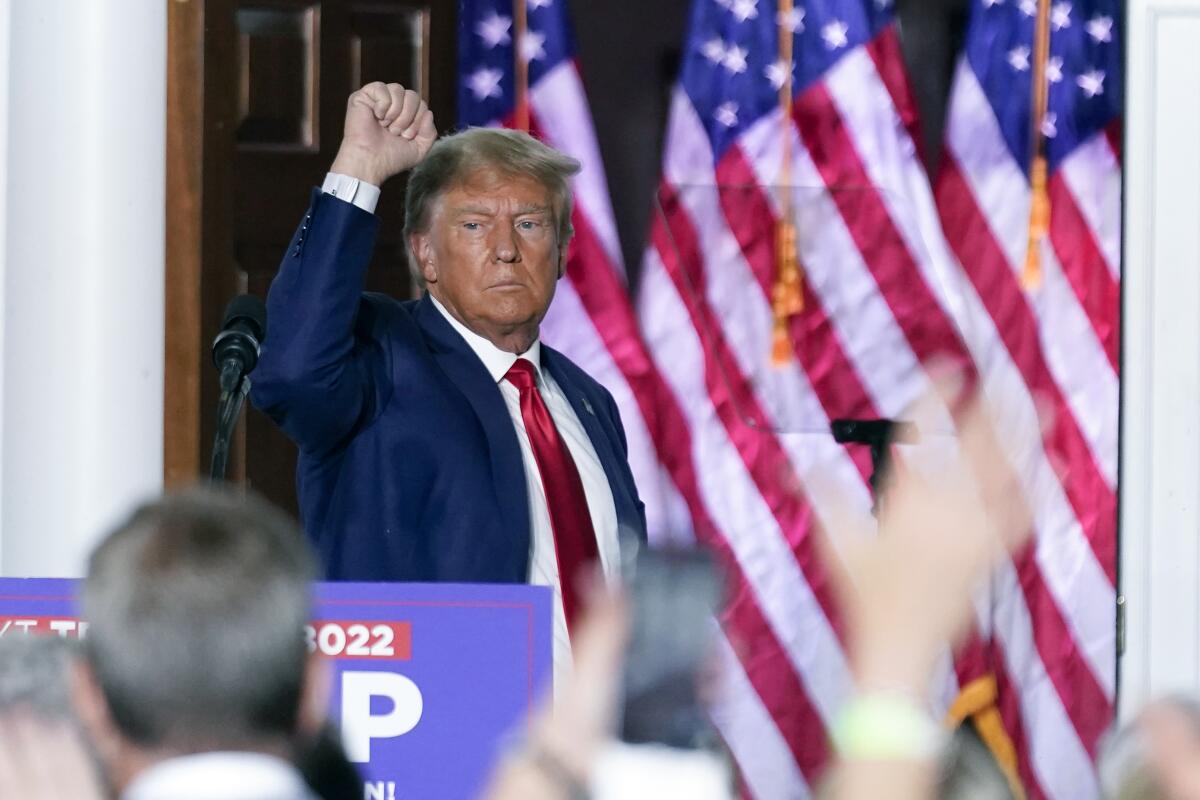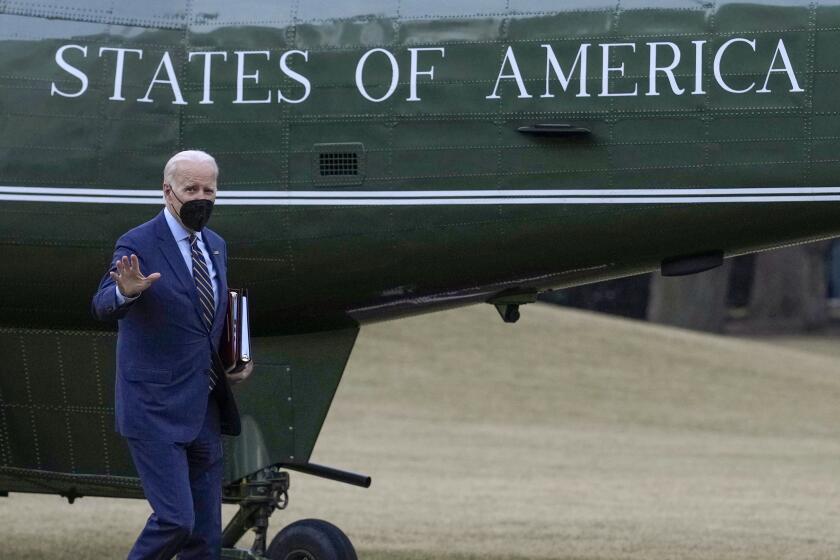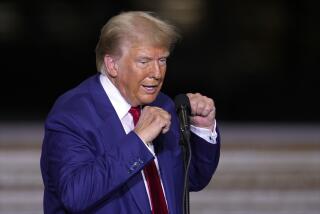Trump and his allies try to spin classified documents case with myths and misinformation

- Share via
Former President Trump stuck to a familiar script at a campaign event held hours after he pleaded not guilty Tuesday in a federal court to 37 felony counts connected to his handling of classified documents.
Echoing the arguments he and his allies have made in news interviews, speeches and social media posts, Trump attempted to paint the indictment as “election interference” and “political persecution.”
“I did everything right and they indicted me,” he told supporters gathered at his golf club in Bedminster, N.J., on Tuesday night.
Ever since the former president revealed last week that he had been indicted, he and his allies have put forward a number of legal and political arguments, and proliferated many falsehoods about the process. Some Trump surrogates have incorrectly claimed that he had declassified the documents and so did nothing wrong, while others have said that even if he did mishandle certain records, he’s not the first to do so.
Trump also repeated on Tuesday his criticism of the Department of Justice’s decision to charge him under the Espionage Act.
“The Espionage Act has been used to go after traitors and spies,” he said. “It has nothing to do with a former president legally keeping his own documents.”
As laid out in the 49-page indictment unsealed last week, Trump is not being accused of being a spy. He’s facing 31 counts of willful retention of national defense documents, as well as other charges including obstruction of justice.
Here are some of the claims made by the former president and his allies in recent days:
‘Political persecution’
Trump is the first former president to face federal charges, but President Biden is also in an unprecedented situation as the Justice Department oversees a case against the leading GOP candidate seeking to challenge him in next year’s presidential election.
Biden and Atty. Gen. Merrick Garland have said publicly that they have not communicated with each other about the case, and the president has refrained from campaigning on Trump’s legal woes. But that hasn’t stopped Trump and his supporters, including members of Congress, from falsely suggesting that Biden is behind the indictment.
“If the president in power can jail his political opponents, which is what Joe Biden is trying to do ... we don’t have a republic anymore,” said Sen. Josh Hawley (R-Mo.), who has a law degree from Yale University and once served as Missouri’s attorney general. “We don’t have the rule of law or Constitution.”
Hawley went on to say Biden and his “cronies” were trying to “take out their chief political opponent.”
Trump was indicted by a federal grand jury. To protect the integrity and independence of the investigations into Trump ahead of his and Biden’s expected presidential runs, Garland appointed veteran federal prosecutor Jack Smith in November to serve as special counsel overseeing probes into the former president’s handling of classified documents and his efforts to overturn his loss in the 2020 election.
Biden was asked last week what he would say to Americans asking about the independence of his Justice Department.
“I have never once — not one single time — suggested to the Justice Department what they should do or not do, relative to bringing a charge or not bringing a charge,” Biden said Thursday. “I’m honest.”
‘As president I could have declassified it’
Rep. Jim Jordan (R-Ohio), a Trump ally and chair of the House Judiciary Committee, insisted over the weekend that Trump had declassified all of the documents in his possession.
“He has said time and time again he declassified all this material,” Jordan said on CNN’s “State of the Union” on Sunday. “This is the most political thing I have ever seen.”
The indictment alleges that on at least two occasions, Trump showed documents that he acknowledged were classified to people who did not have security clearances.
In one July 2021 incident that the indictment says was caught on tape, Trump showed his publisher and others what he called a “plan of attack” prepared by the Department of Defense, and said, “As president I could have declassified it. ... Now I can’t, you know, but this is still a secret.”
There is no precedent for a president asserting that they have declassified something secret and are not subject to federal laws on their handling.
When asked if he had evidence that Trump had declassified the documents before leaving office, Jordan said: “I go on the president’s word, and he said he did.”
There is no indication that Trump declassified these documents, and he has yet to provide any proof of doing so. The declassification process includes certain procedures, records and logs so the intelligence community knows what information is secret and what is not.
Some of the documents Trump is accused of illegally retaining detail U.S. nuclear information, which the Atomic Energy Act protects from being declassified. The act has never been challenged in court.
Espionage Act vs. Presidential Records Act
Trump and others have argued that the former president should not have been charged under the Espionage Act.
In response to the Watergate scandal that led to Richard Nixon’s 1974 resignation, in 1978 the Presidential Records Act was enacted to prevent former and future presidents and members of the executive branch from destroying or keeping records that were created for or by them as part of their White House roles. For example, notes that a president scribbles in the margins of a memo would normally be considered a presidential record, while a letter or email to a spouse would be personal.
Trump has claimed the documents at issue in the case are personal records. The indictment paints another picture. The 31 classified documents that were found in his possession include secret and top-secret documents such as intelligence briefings on foreign countries and information on the military operations and capabilities of the United States and other countries.
Sen. Lindsey Graham, a South Carolina Republican who has endorsed Trump’s reelection bid, said he believes the president has been overcharged.
“Whether you like Trump or not, he did not commit espionage,” Graham said Sunday on ABC’s “This Week.” “He did not disseminate, leak or provide information to a foreign power or a news organization to damage this country.”
The Justice Department has not referenced the Presidential Records Act in this case. Instead, it has argued that the documents are not presidential records, but government records that belong to the intelligence agency that created them.
The Espionage Act addresses the disclosure and handling of classified information and says that anyone who has “unauthorized possession” of national defense information and “willfully retains the same and fails to deliver it to the officer or employee of the United States entitled to receive it” has broken the law.
Biden and the Clintons
Several Trump allies have claimed that his legal troubles are fueled by politics. As Trump railed against the current administration Tuesday and accused Biden of being corrupt, Fox News displayed a chyron that called the current president a “wannabe dictator.”
Others have said they believe Trump is being investigated for actions others have engaged in without consequences.
“We all know that there is an unequal application of the law going on here,” Rep. Byron Donalds, a Florida Republican, told reporters on Capitol Hill this week.
Donalds referenced former Secretary of State Hillary Clinton’s email practices, classified documents found in Biden’s possession, and a 2010 case involving taped conversations with former President Bill Clinton.
While all of the cases deal with records, there are differences between them and Trump’s case.
The FBI probed Hillary Clinton’s use of a private email server in 2016. In November 2016, two days before the election that Clinton would lose to Trump, former FBI Director James Comey closed the investigation without recommending charges.
But he criticized Clinton for being “extremely careless,” and said that hostile actors could have accessed the server. Comey laid out several factors that would have supported criminal charges, including “clearly intentional and willful mishandling of classified information” and “efforts to obstruct justice” — and said they did not apply in her case.
Many of the documents found on Clinton’s email server had been classified after she received them. And at the time, the unauthorized removal or retention of classified documents — a different crime than what Trump has been charged with — was only a misdemeanor. (A 2018 law signed by Trump changed it to a felony.)
After news broke that Biden’s personal attorneys had found classified documents in his possession earlier this year, including in the garage of his Delaware home, Atty. Gen. Garland appointed Robert Hur, a former Trump U.S. attorney appointee, as special counsel to investigate whether Biden had mishandled classified documents. Biden’s team has cooperated with the Justice Department, and Hur’s investigation is ongoing.
Former U.S. Atty. Robert Hur will investigate whether ‘any person or entity violated the law’ in connection with the unauthorized removal and retention of the records.
In 2010, the conservative legal group Judicial Watch sued the National Archives over a set of 79 audio tapes of a historian’s interviews with former President Clinton while he was in office.
Judicial Watch argued that the tapes, which Clinton kept after leaving the White House, were presidential records that should have been turned over to the National Archives under the Presidential Records Act, alleging that they captured official business. Clinton had designated the tapes, which were recorded to be part of an oral history, as personal records.
U.S. District Judge Amy Berman Jackson ruled that the National Archives did not have the power to change the tapes’ designation or to compel the former president to produce them. Instead, that power lay with the president during his term.
Trump and his allies have latched on to that case, both as an example of a perceived double standard and as a legal precedent that they say should also apply to Trump.
“Not only was Bill Clinton not even considered for criminal prosecution based on the tapes he took, but when he was sued for them, he won the case,” Trump told supporters Tuesday.
At issue in Trump’s case, however, is not whether the documents were personal or presidential records, but whether he retained documents related to national defense without authorization, and whether he broke other laws, such as conspiring to obstruct justice, in the process.
As Trump awaits his day in court, political rivals within his own party have started to take a more critical tone on his federal charges compared with their reactions to lesser charges issued by a Manhattan grand jury earlier this year.
“This indictment contains serious charges, and I cannot defend what is alleged,” former Vice President Mike Pence said of the federal case this week.
Earlier this month, the Justice Department closed its probe into Pence’s handling of sensitive information after classified documents were found at his home and voluntarily returned to the FBI earlier this year. No charges were recommended.
More to Read
Get the L.A. Times Politics newsletter
Deeply reported insights into legislation, politics and policy from Sacramento, Washington and beyond. In your inbox three times per week.
You may occasionally receive promotional content from the Los Angeles Times.













